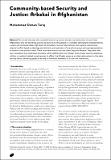| dc.contributor.author | Tariq, Mohammad Osman | en |
| dc.date.accessioned | 2016-01-27T14:06:23Z | |
| dc.date.available | 2016-01-27T14:06:23Z | |
| dc.date.issued | 01/03/2009 | en |
| dc.identifier.citation | Tariq, M., O. (2009) Community?based Security and Justice: Arbakai in Afghanistan. IDS Bulletin 40(2): 20-27 | en |
| dc.identifier.issn | 1759-5436 | en |
| dc.identifier.uri | https://opendocs.ids.ac.uk/opendocs/handle/20.500.12413/8137 | |
| dc.description.abstract | This article discusses the successful bottom?up justice and security institutions in south?east Afghanistan that are delivering justice and security to the people in a complex atmosphere characterised by a weak and contested state, high levels of corruption, massive international and regional intervention, internal conflict based on ideology and ethnicity, and exclusion of one ethnic group and overrepresentation of others in the political arena. These local?level institutions are called Jirga and Arbakai. They have their own conceptual and contextual principles, which differentiate the Arbakai from private security companies, militias, or warlord?related armed groups. In effect, the Arbakai serves as an alternative system to the state security sector, delivering physical security to individual members of a tribe and community. | en |
| dc.format.extent | 8 | en |
| dc.publisher | Blackwell Publishing Ltd | en |
| dc.relation.ispartofseries | IDS Bulletin Vol. 40 Nos. 2 | en |
| dc.rights.uri | http://www.ids.ac.uk/files/dmfile/IDSOpenDocsStandardTermsOfUse.pdf | en |
| dc.title | Community?based Security and Justice: Arbakai in Afghanistan | en |
| dc.type | Article | en |
| dc.rights.holder | © 2009 The Author. Journal compilation © Institute of Development Studies | en |
| dc.identifier.doi | 10.1111/j.1759-5436.2009.00018.x | en |

